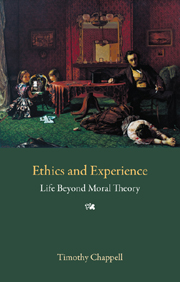Book contents
- Frontmatter
- Contents
- Acknowledgements
- 1 The turn to reason: how human beings got ethical
- 2 Demarcation: what does “ethical” mean?
- 3 Motivation: why be moral?
- 4 Deliberation: the question of reason
- 5 Introducing subjectivism and objectivism
- 6 Five arguments for ethical subjectivism
- 7 The content of ethics: expressivism, error theory, objectivism again
- 8 Virtue ethics
- 9 Utilitarianism
- 10 Kantianism and contractarianism
- 11 Theory and insight in ethics
- Further reading
- Bibliography
- Index
2 - Demarcation: what does “ethical” mean?
- Frontmatter
- Contents
- Acknowledgements
- 1 The turn to reason: how human beings got ethical
- 2 Demarcation: what does “ethical” mean?
- 3 Motivation: why be moral?
- 4 Deliberation: the question of reason
- 5 Introducing subjectivism and objectivism
- 6 Five arguments for ethical subjectivism
- 7 The content of ethics: expressivism, error theory, objectivism again
- 8 Virtue ethics
- 9 Utilitarianism
- 10 Kantianism and contractarianism
- 11 Theory and insight in ethics
- Further reading
- Bibliography
- Index
Summary
Not to arrange one's life with regard to some end is a mark of great foolishness.
(Aristotle, Eudemian Ethics 1214b8)What ethics is not
Chapter 1 defined ethics as the use of reason to answer the question “How should life be lived?”. That definition reminds us immediately of some things that ethics is not. For one thing, the definition shows that ethics is not just about what we do. The question “How should life be lived?” is certainly about our actions, our behaviour, our choices. But it is about many other things too: not just what we should choose, but also how we should choose it; not just how we should act, but also how we should think and feel and respond, what kind of persons we should be, and so on.
Other things that “ethical” does not mean include “legal” and “political”. There are ethical rules, and there are legal rules, and there are political rules; but they are different sorts of rules serving different sorts of purposes.
Nor is the ethical the same as the personal or the emotional. When I say “It's wrong to steal or kill” I am not just saying “I don't personally like people stealing or killing”. You could say “It's wrong to steal, and I don't personally like people stealing”, without saying the same thing twice.
- Type
- Chapter
- Information
- Ethics and ExperienceLife Beyond Moral Theory, pp. 5 - 10Publisher: Acumen PublishingPrint publication year: 2009



